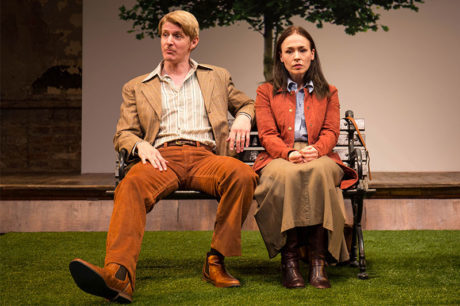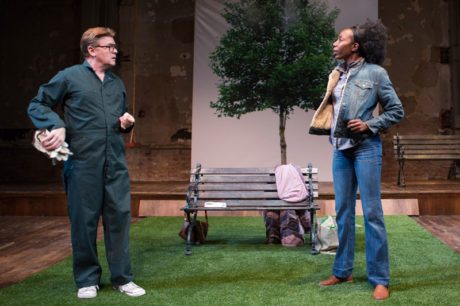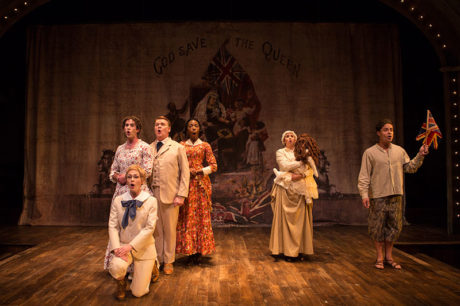Caryl Churchill’s Cloud Nine, which premiered in London in 1979, is rightly considered a landmark play. It is pivotal for me personally as well, ever since I saw the legendary Tommy Tune production off-Broadway in 1981.

At the time I was immersed in counter-cultural people’s theater, which tended to be wildly experimental in form but often single-issue-focused in content. The women’s movement was making waves, and there were remarkable women playwrights at work, mainly off-off-Broadway. But in commercial theater there were yet few plays that looked at the world through the lens of women’s lived experience (the singular exception being Ntozake Shange’s 1975 for colored girls who have considered suicide / when the rainbow is enuf, wonderfully revived at Theater Alliance).
Churchill’s Cloud Nine exploded my consciousness about what was possible to do and say in theater about the intersecting hierarchies of sex, race, and class all in the same play. From a shrewdly woman-centric, anti-imperialist viewpoint, Churchill dramatizes that interlocking-oppression matrix with scathing wit, surreal comedy, and inspired strokes of cross-gender, cross-race, and cross-generation casting.
When the play premiered, half of it was a period piece, and nowadays both halves are. Act I is set in Victorian colonial Africa, and Act II is set 100 years later in London in 1979. Some of the characters in Act I reappear in Act II but have aged only 25 years. It’s one of those time-and-place stunts that make theater so much fun.
So it was a thrill to see what Director Michael Kahn has done with Cloud Nine at Studio Theatre. The play’s wit and wisdom—Churchill’s gimlet eye on the isms—is as spot-on as ever. There are scores of delightful, insightful details in the performances that tease out meanings and moments that are faithful to the text yet seemed fresh. And Kahn’s staging brings all the play’s erotics to the surface with brand-new candor.
In Act I, an imperious British officer named Clive has been posted to a country in Africa to oversee the Crown’s dubious interests. Clive (John Scherer) is the very model of a major self-aggrandizer. His wife Betty (Wyatt Fenner), a part meant to be played by a man, is a sendup of submissive feminine frailty (“I am man’s creation…what men want is what I want to be,” she flutters.) Their black manservant, meant to be played by a white actor, is Joseph (Philippe Bowgen), who considers his own people “bad people” (“What white men want, I dearly want to be”). Betty’s scolding mother, also Clive’s adoring mother-in-law, is Maud (Joy Jones). Edward (Laura C. Harris), a part meant to be played by a woman, is Clive and Betty’s sensitive son, who is having a hard time becoming the man he’s supposed to be as he much prefers to play with dolls.
The sexual attractions go every which way.

A spirited widow, Mrs. Saunders, arrives seeking safety from restless natives, and Clive resumes his carnal moves on her (his head up under her skirt at one point in an emulation of oral sex). The very assertive Mrs. Saunders is played by Holly Twyford, who also plays Ellen, Edward’s very unassertive governess. (Twyford’s character switching is masterful; it’s as if whenever she changes costume offstage, she alters her entire acting instrument.)
A brave and butch explorer arrives for a visit, a friend of Clive’s named Mr. Harry Bagley (Christian Pedersen), and we learn he’s got a bro crush on Clive. The scene when Harry comes on to Clive, mistaking Clive’s intentions, is made all the more hilarious by its explicitness. Meanwhile the boy Edward wants a reprise of the sex that Harry had with him before, and the production’s physicalization spells out what Edward desires. With similarly graphic specificity, Betty signals she has a thing for Harry, and Ellen wants Betty bad.
In Cloud Nine’s Act II, the colonial history satirized in Act I is never mentioned. Instead we get an assortment of contemporary personal relationship issues—sexual couplings of several sorts—without any particular social context other than the generic hip 1970s. Evidently we are well into the sexual revolution, the women’s movement, and gay liberation, but the relationship between the two halves of Cloud Nine can seem elusive on first viewing. Suddenly time and place have changed; and though we see the same actors, they’re playing different roles for no apparent reason. It is here that Kahn’s direction does great service to the play, because the sexual specificity with which he has staged Act I emerges in Act II as the visceral connective tissue between the two.
Betty (played now by Twyford) is making her way in the world solo. Betty’s daughter, Victoria (Harris), is now married unhappily to Martin (Pedersen), a man who uses trendy liberationist sensitivity to belittle her. Betty’s son, Edward (Scherer), is now a gardener and in a gay relationship with Gerry (Fenner), who does not reciprocate Edward’s sexual attraction and romantic attachment. A graphic monologue by Gerry about cruising delivers as much tristesse as sex. Victoria, rebounding from Martin, seeks sexual solace with a lesbian single mother named Lin (Jones). Lin’s daughter Cathy, played by a man (Bowgen), is a tomboy who likes guns. In a quirky but typically ’70s communal commingling, Lin and Victoria and Edward all end up living together—and then Edward discloses he himself might be lesbian and maybe a woman too.

As I watched Kahn’s refresh of Cloud Nine with great appreciation, and not a few hearty laughs, I recalled his revitalization of another classic comedy from the pre-AIDS late ’70s, his 2013 production of Harvey Fierstein’s Torch Song Trilogy, also at Studio. And having just seen Round House Theatre’s stunning revival of Tony Kushner’s masterwork set in the dark ages of AIDS, Angels in America: Millennium Approaches, I cannot help but be grateful to Studio Theatre and Michael Kahn for bringing back Cloud Nine and shining such enjoyable light on it.
Studio Theatre’s Cloud Nine is a very smart take on a very smart play that’s a very sly take on sexual mores back in the day. If you get off on salience and substance, you’ll have very a good time.
Running Time: Two hours and 30 minutes, with an intermission.
Cloud 9 plays through October 16, 2016, at The Studio Theatre – 1501 14th Street, NW, in Washington, DC. For tickets call (202) 332-3300, or purchase them online.
__
Note: Some passages here about the play Cloud Nine were originally written for my
Review of Gallaudet University Theatre and Dance Program’s “excellent and entertaining” production of it, directed by Monique Holt in April 2016.




